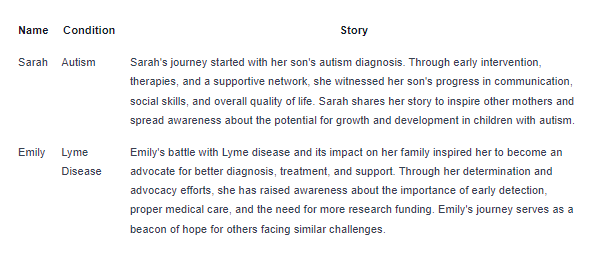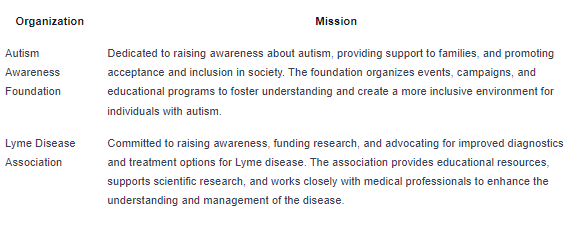A Mother's Autism and Lyme Disease Journey
Embark on a transformative journey as a mother navigates autism and Lyme disease. Discover hope, support, and inspiring success stories.

A Mother's Transformative Journey
In this inspiring story, we explore the transformative journey of a mother who navigated the challenges of raising a child with autism and Lyme disease. This dedicated mother's unwavering love and determination led her on a path of discovery, resilience, and ultimately, success.
Introduction to the Mother's Story
At the heart of this journey is a mother's deep love and commitment to her child. Faced with the unique challenges of raising a child with autism and Lyme disease, she embarked on a transformative journey that would not only impact her family but also inspire others facing similar circumstances.
Through her story, we witness the highs and lows, the triumphs and setbacks, and the unwavering strength that allowed her to overcome the obstacles along the way. Her experience sheds light on the often untold struggles faced by parents of children with complex medical conditions.
Overview of Autism and Lyme Disease
Autism, a neurodevelopmental disorder, affects communication, social interaction, and behavior. It manifests differently in each individual, ranging from mild to severe symptoms. Autism is often diagnosed in early childhood, and early intervention plays a crucial role in supporting the child's development and well-being.
Lyme disease, on the other hand, is a tick-borne illness caused by the bacterium Borrelia burgdorferi. It can lead to a range of symptoms, including fatigue, joint pain, and neurological issues. When Lyme disease and autism coexist, the challenges faced by both the child and their caregiver can become even more complex.
While autism and Lyme disease are distinct conditions, their co-occurrence can present unique challenges in diagnosis, treatment, and management. It requires a comprehensive and holistic approach to address the needs of the child and provide the necessary support for their overall well-being.
Understanding the intricacies of autism and Lyme disease is essential in appreciating the complexities faced by individuals and families affected by these conditions. By gaining knowledge and empathy, we can better support and advocate for those on a similar journey.
As we delve further into this inspiring story, we will explore the signs and symptoms, the diagnosis process, and the various treatment options that the mother and her child encountered. Through their experiences, we hope to shed light on the path towards hope, resilience, and success.
Recognizing the Signs
When it comes to autism and Lyme disease, recognizing the signs early on is crucial for timely intervention and support. In this section, we will explore the early signs and symptoms that a mother may observe in her child, as well as the challenges faced during the diagnosis process.
Early Signs and Symptoms
Recognizing the early signs of autism and Lyme disease can be challenging, as they can vary from child to child. However, there are some common indicators that a mother may observe in her child, which can prompt further investigation or evaluation. Some of the early signs and symptoms include:
Early Signs and Symptoms
Delayed or limited speech and language development
Difficulty with social interactions and communication
Repetitive behaviors or restricted interests
Sensory sensitivities or aversions
Fatigue, joint pain, and neurological symptoms (in the case of Lyme disease)
These signs may manifest differently in each child, and it's important to remember that not all children will display the same symptoms. However, if a mother notices any of these indicators in her child, it may be worth discussing her concerns with a healthcare professional or seeking a comprehensive evaluation.
Diagnosis and Challenges
Obtaining a diagnosis for autism or Lyme disease can be a complex and challenging process. Various factors, including the uniqueness of each child's symptoms and the lack of standardized diagnostic tests, contribute to these challenges.
For autism, the diagnosis is typically made through a comprehensive assessment conducted by a team of professionals, such as psychologists, speech therapists, and developmental pediatricians. This assessment involves evaluating the child's behavior, communication skills, social interactions, and developmental milestones. The process can be time-consuming and may require multiple visits to different specialists.
In the case of Lyme disease, diagnosis can be particularly challenging due to the variability of symptoms and the limitations of available diagnostic tests. Lyme disease is often diagnosed based on clinical symptoms, medical history, and the presence of specific antibodies in blood tests. However, false negatives can occur, leading to delayed or missed diagnoses.
The challenges faced during the diagnosis process can be emotionally and mentally taxing for both the mother and the child. It's important for mothers to seek support from healthcare professionals, support groups, and other parents who have gone through similar experiences. This can provide valuable guidance, understanding, and reassurance during this challenging time.
By recognizing the early signs and symptoms of autism and Lyme disease and understanding the complexities of the diagnosis process, mothers can take the necessary steps to seek appropriate support and interventions for their children.
Navigating Treatment Options
When faced with the challenges of autism and Lyme disease, mothers often find themselves navigating through various treatment options to help their children. These options can be categorized into traditional approaches and alternative therapies and strategies.
Traditional Approaches
Traditional approaches to treating autism and Lyme disease often involve medical interventions and therapies recommended by healthcare professionals. These approaches may include:
- Medication - Depending on the individual's symptoms and medical history, doctors may prescribe certain medications to manage specific symptoms associated with autism or Lyme disease. It's important to consult with healthcare professionals to determine the most suitable medication and dosage for each individual case.
- Behavioral Therapy - Behavioral therapy, such as Applied Behavior Analysis (ABA), is commonly used to help children with autism develop adaptive skills and reduce challenging behaviors. This therapy focuses on reinforcing positive behaviors and teaching new skills through structured interventions.
- Speech and Language Therapy - Many individuals with autism experience difficulties with speech and language. Speech and language therapy can help improve communication skills and address challenges related to speech articulation, social communication, and language development.
- Occupational Therapy - Occupational therapy aims to enhance individuals' ability to participate in daily activities and improve their overall quality of life. For individuals with autism, occupational therapy focuses on developing skills related to sensory processing, fine motor coordination, self-care, and social interaction.
Alternative Therapies and Strategies
In addition to traditional approaches, many mothers explore alternative therapies and strategies to complement the traditional treatments. These alternative options may include:
- Dietary Interventions - Some mothers may explore dietary changes, such as gluten-free or casein-free diets, as there is anecdotal evidence suggesting that these diets may help alleviate certain symptoms associated with autism. However, it's important to consult with a healthcare professional or a registered dietitian before implementing any significant dietary changes.
- Supplement Therapy - Certain dietary supplements, such as omega-3 fatty acids, probiotics, and vitamins, are sometimes used as complementary treatments for individuals with autism or Lyme disease. It's crucial to consult with healthcare professionals to ensure the safety and effectiveness of these supplements, as well as to determine appropriate dosages.
- Mind-Body Practices - Some mothers explore mind-body practices like yoga, meditation, and mindfulness techniques to help manage stress, promote relaxation, and improve overall well-being. These practices can be beneficial for both the child and the mother, fostering a sense of calm and balance amidst the challenges they face.
- Alternative Therapies - Various alternative therapies, such as music therapy, art therapy, and animal-assisted therapy, are also utilized by some mothers to support their children's development and well-being. These therapies can provide creative outlets, emotional support, and opportunities for self-expression.
It's important for mothers to approach alternative therapies with caution and to discuss them with healthcare professionals. While some alternative therapies may have anecdotal support, scientific evidence regarding their effectiveness and safety may be limited. Consulting with healthcare professionals can help ensure that treatment approaches are evidence-based, individualized, and tailored to the specific needs of each child.
Embracing the Journey
When faced with the challenges of autism and Lyme disease, a mother's journey can be both arduous and transformative. Throughout this journey, it's essential to develop coping mechanisms and seek support systems to navigate the highs and lows. Additionally, celebrating milestones and progress along the way can provide encouragement and motivation.
Coping Mechanisms and Support Systems
Coping with the daily demands of caring for a child with autism and Lyme disease requires resilience and support. Here are some coping mechanisms and support systems that can help mothers on their transformative journey:
- Self-Care: Taking care of oneself is crucial to maintain physical and emotional well-being. This may involve practicing self-care activities such as exercise, meditation, or engaging in hobbies. It's important for mothers to prioritize their own needs and seek respite when necessary.
- Seeking Professional Help: Consulting with healthcare professionals, therapists, and counselors can provide valuable guidance and support. These professionals can offer strategies for managing stress, emotional support, and help in developing effective coping mechanisms.
- Building a Support Network: Connecting with other parents who have experienced similar challenges can be a source of comfort and understanding. Support groups, online communities, and local organizations can provide opportunities to share experiences, exchange advice, and offer emotional support.
- Educating Oneself: Gaining knowledge about autism and Lyme disease can empower mothers to better understand their child's condition and make informed decisions. Accessing reputable resources, attending workshops, and participating in educational programs can enhance their understanding and equip them with valuable tools.
Celebrating Milestones and Progress
In the midst of the challenges, it's important for mothers to celebrate the milestones and progress their child achieves. Recognizing and acknowledging these achievements can provide a sense of accomplishment and motivation to continue the journey. Here are some ways to celebrate milestones and progress:
- Create a Milestone Journal: Keeping a journal to document and celebrate milestones and progress can serve as a reminder of how far both the child and mother have come. It can be a source of inspiration during challenging times and a way to reflect on the growth and achievements achieved.
- Small Rewards: Offering small rewards or treats to the child for reaching specific goals can provide positive reinforcement and motivation. This can include simple rewards such as a favorite activity, a special outing, or a small token of appreciation.
- Sharing Accomplishments: Sharing the child's achievements with family, friends, and the support network can create a sense of pride and support. This can be done through sharing photos, videos, or personal stories that highlight the progress made.
- Setting Realistic Expectations: Celebrating progress also means acknowledging that there will be ups and downs along the journey. Setting realistic expectations helps to avoid undue pressure and allows for a more balanced perspective on progress.
By embracing coping mechanisms and seeking support systems, mothers can navigate their transformative journey with greater resilience. Celebrating the milestones and progress achieved along the way provides motivation and encouragement to continue the path toward growth and development.
Finding Hope and Inspiration
When facing the challenges of autism and Lyme disease, finding hope and inspiration can be a source of strength for mothers and families. In this section, we will explore success stories and testimonials from individuals who have undergone similar journeys, as well as the advocacy and awareness efforts that contribute to a supportive community.
Success Stories and Testimonials
Success stories and testimonials from other mothers who have navigated the complexities of autism and Lyme disease can provide a sense of hope and inspiration. These stories highlight the progress, milestones, and achievements that can be attained through perseverance, dedication, and the right support.

These success stories and testimonials remind mothers that they are not alone and that there is a community of individuals who have overcome obstacles and achieved positive outcomes for their children with autism and Lyme disease.
Advocacy and Awareness Efforts
Advocacy and awareness play a crucial role in supporting families affected by autism and Lyme disease. Various organizations and individuals work tirelessly to promote understanding, provide resources, and advocate for policy changes that benefit those living with these conditions.

Through their efforts, these organizations and many others contribute to the broader mission of creating a supportive and informed community. Their advocacy work helps to improve access to resources, enhance public understanding, and drive positive change for individuals and families affected by autism and Lyme disease.
By sharing success stories and participating in advocacy and awareness efforts, mothers can find hope, inspiration, and a sense of empowerment in their transformative journeys. These stories and initiatives remind us that, despite the challenges, there is a wealth of support available and a community that believes in the potential for growth and progress.
Moving Forward
After overcoming numerous challenges and experiencing transformative growth, the mother's journey continues as she navigates the ongoing path of autism and Lyme disease. Moving forward, she remains dedicated to finding resources and providing support for others facing similar journeys.
Continuing the Journey
For the mother, the journey of autism and Lyme disease is ever-evolving. She understands the importance of staying informed about the latest developments in research, treatment options, and support networks. By staying up-to-date, she can make informed decisions and ensure the best possible outcomes for her child.
Continuing the journey involves ongoing communication with healthcare professionals, therapists, and educators. Regular check-ups and evaluations help monitor progress and identify any new challenges or areas that require additional attention. By maintaining an open line of communication, the mother can collaborate with the experts involved in her child's care to create a comprehensive and personalized treatment plan.
Resources and Support for Others
Throughout her own transformative journey, the mother has gained valuable insights and knowledge that she can share with others facing similar circumstances. She recognizes the importance of spreading awareness and providing support to families affected by autism and Lyme disease.
To support others on their journeys, the mother actively seeks out and shares relevant resources. These resources can include books, websites, support groups, and educational materials. By sharing information, she hopes to empower other parents, caregivers, and individuals living with autism and Lyme disease to make informed decisions and access the support they need.
In addition to sharing resources, the mother actively participates in support networks and advocacy efforts. She understands the strength and comfort that comes from connecting with others who have shared experiences. Whether through local support groups or online communities, she seeks out opportunities to share her journey, offer support, and find solace in the stories and experiences of others.
By continuing her journey and providing resources and support to others, the mother remains a beacon of hope and inspiration. Through her ongoing efforts, she strives to create a community that uplifts and empowers individuals and families affected by autism and Lyme disease.
Throughout this transformative journey, the mother has demonstrated resilience, determination, and a deep love for her child. Her story serves as a source of inspiration for others, reminding us that even in the face of challenges, there is always hope, and the possibility of finding strength and success in the journey.
Sources
https://www.personalconsult.com/services/lyme-disease/a-mothers-autism-and-lyme-disease-journey/
https://www.scientificamerican.com/article/mothers-may-pass-lyme-disease-to-children-in-the-womb/
https://pubmed.ncbi.nlm.nih.gov/17980971/
Similar articles
We’re here to help you

Our team is here to assist you in this process. Contact us for any assistance.
it’s easy to apply
We Accept Most Insurances
Our in-network insurance partnerships make ABA therapy more accessible to families throughout our service areas.







Our Insurance Process
We'll request your insurance details to help us verify your plan's coverage for ABA therapy. Once we've received this information, we'll walk you through your benefits, including copayments, deductibles and out-of-pocket maximums, so you know what to expect in advance.
Our team will then handle the preauthorization and all the necessary paperwork.
.svg)





















.jpeg)


































.jpeg)




.jpeg)







.jpeg)











.jpeg)
















